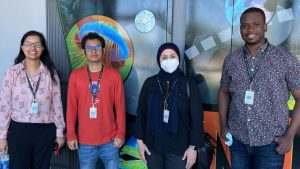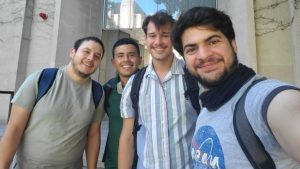Feb. 28, 2023 — To tackle the nation’s biggest scientific and engineering challenges, the U.S. Department of Energy’s (DOE) Argonne National Laboratory continues to build a more diverse and inclusive workforce in high performance computing (HPC).

“The research in HPC and computing sciences requires multidisciplinary collaboration involving the contributions of many diverse people with different skills and areas of training. We need to engage a broad range of people throughout our population to provide their creative ideas and contributions to this multidisciplinary research,” said Lois Curfman McInnes, a senior computational scientist at Argonne.
The DOE’s Exascale Computing Project is a multi-lab effort to support the nation’s first exascale systems. To support that mission, the project is spearheading the multi-lab Broadening Participation Initiative to help prepare the next generation of researchers for the next generation of supercomputers.
McInnes serves as lead organizer of the initiative, which features three complementary thrusts that leverage and complement existing efforts on workforce development in DOE national laboratories, computing facilities and the HPC computational science community.
Jini Ramprakash, deputy division director at the Argonne Leadership Computing Facility (ALCF), and Paige Kinsley, ALCF education and outreach lead, are leading one of the thrusts, Intro to HPC, which is developing training materials for educating newcomers to the world of HPC. The ALCF is a DOE Office of Science user facility at Argonne. The second thrust is an HPC Workforce Development and Retention Action Group.
McInnes co-leads the third thrust, working to build a pipeline of undergraduate and graduate students for opportunities at Argonne and other DOE labs through Sustainable Research Pathways for HPC (SRP-HPC), an internship and mentoring program that ran for the first time in the summer of 2022. SRP-HPC is designed to connect students from (and faculty working with) underrepresented groups with DOE national laboratory scientists to encourage lasting collaborations and jump-start careers.
“It is well known that within the STEM field generally, including computing sciences, there is an underrepresentation of important demographics including people who are African American, Latin, women, first-generation college students and other target groups,” said McInnes. “We strongly believe that we are more creative and productive when teams represent the breadth of our population.”
As part of the inaugural 10-week SRP-HPC program, Argonne hosted six teams of 16 students and faculty, who were matched with projects that related to their work or interests. Students had the opportunity to experience leading technologies on pilot platforms for Aurora, Argonne’s exascale computer currently under construction.
Mykala Wright, a Chicago native and now senior at Philander Smith College, ventured on to Argonne’s campus for the first time as part of the program because her data science professor suggested it. Eager to try something new, Wright loved the experience because it challenged her and helped her learn more computer and data science than she would have ever learned in class.
“Originally, I wanted to go into cyber security after college, but now I think I’ll go the data science route. It is fun and didn’t even feel like a job to me. It was something I was genuinely excited to do every day,” said Wright.
Wright worked with a cancer-focused code called CANDLE. Her job was to write code that would show results, like a chart showing tumor type and stage, that could be easily read by someone without coding experience.
The Philander Smith College team was mentored by Justin Wozniak, an Argonne computer scientist, and included undergraduate student Knia Williams and assistant professor Suzan Anwar.

One of the Argonne team mentors, Jose M. Monsalve Diaz, is a postdoctoral appointee who received his Ph.D. from the University of Delaware. Since he had the opportunity to work with the ALCF while completing his thesis, he wanted to pay it forward by participating in SRP-HPC.
Having worked with students in the Latin community at the University of Delaware, Monsalve Diaz knew the connections from the SRP-HPC program would be vital for students’ careers and help Latin students see Argonne as a potential future employer.
Monsalve Diaz’s team consisted of two students and a faculty member in the Department of Electrical and Computer Engineering at his alma mater. Rafael A. Herrera Guaitero, a first-year Ph.D. student, and Diego Roa Perdomo, a third-year Ph.D. student, were joined by associate professor Xiaoming Li. The students both worked on improving OpenMP, a programming framework that will be critical for Aurora.
Looking back at his experience, Herrera Guaitero called it incredible. “I was able to contribute to high-impact HPC projects created and maintained by the people who work at Argonne. It was a memorable experience that I hope to repeat next year.”
Roa Perdomo agreed, confirming that Monsalve Diaz did an exceptional job guiding the team through their project and Argonne’s daily life. “Working side by side with scientists and engineers at Argonne showed me the importance of their work and inspired me to pursue a career at the Laboratory,” he said.
“We could really connect what they were doing in their Ph.D. programs and their interests with the research we are doing at Argonne,” said Monsalve Diaz. “Having students of differing levels was a great experience. As a first-year student, Rafael really wanted to learn everything, and as a seasoned Ph.D. student, Diego narrowed the work down to his level.”
Even though the summer program has ended, Herrera Guaitero and Roa Perdomo will continue to collaborate with Argonne throughout the rest of their academic year and Ph.D. program. In the fall, Roa Perdomo started participating in Argonne’s Graduate Research Program, which gives students the opportunity to carry out their thesis research at the Laboratory under the co-sponsorship of an Argonne staff member and a faculty member at the student’s home institution.
Monsalve Diaz hopes their experience will be similar to his own; Argonne played an integral part in his thesis experience and his career path.
“I would like students to be able to see that there are endless opportunities at DOE labs going forward. We can give them this opportunity to see that this is a potential career path,” recalled Monsalve Diaz.
The SRP program is gearing up for next summer, where Monsalve Diaz has already applied to participate again and hopes to bring even more students to Argonne.
The four additional SRP-HPC Argonne teams during summer 2022 included:
- The team from San Diego State University included master’s student Dylan Mather and faculty member Vivian Huangfu. They were mentored by Argonne’s Thomas Brettin, a strategic program manager, and computational scientist Hyunseung “Harry” Yoo.
- The team from the University of North Dakota included undergraduate student James Chegwidden, master’s student Kuang Hsu Wang and faculty member Anjali Sandip. They were mentored by Argonne’s Jeff Larson, a computational mathematician.
- The team from Wichita State University included master’s students Duncan Campbell and Nowshin Nawal and associate professor Abu Asaduzzaman. They were mentored by Hong Zhang, an Argonne computational mathematician and research professor at Illinois Tech.
- The final team included Gideon Idumah, a fourth-year Ph.D. student from Case Western Reserve University, and Bilas Talukdar, a second-year Ph.D. student from the New Jersey Institute of Technology. They were mentored by Argonne computer scientist Prasanna Balaprakash.
Additional Argonne staff who are key contributors to the ECP Broadening Participation Initiative include Kevin A. Brown, Anshu Dubey, Yasaman Ghadar, Rinku Gupta, David Martin, Victor Mateevitsi and Michael Papka.
Moreover, Valerie Taylor, director of Argonne’s Mathematics and Computer Science division, serves as liaison for the initiative from the multi-lab Computational Research Leadership Council.
“It is exciting to have this program continue for Summer 2023,” said Taylor.
About ALCF & Argonne National Lab
The Argonne Leadership Computing Facility provides supercomputing capabilities to the scientific and engineering community to advance fundamental discovery and understanding in a broad range of disciplines. Supported by the U.S. Department of Energy’s (DOE’s) Office of Science, Advanced Scientific Computing Research (ASCR) program, the ALCF is one of two DOE Leadership Computing Facilities in the nation dedicated to open science.
Argonne National Laboratory seeks solutions to pressing national problems in science and technology. The nation’s first national laboratory, Argonne conducts leading-edge basic and applied scientific research in virtually every scientific discipline. Argonne researchers work closely with researchers from hundreds of companies, universities, and federal, state and municipal agencies to help them solve their specific problems, advance America’s scientific leadership and prepare the nation for a better future. With employees from more than 60 nations, Argonne is managed by UChicago Argonne, LLC for the U.S. Department of Energy’s Office of Science.
Source: Marguerite Huber, ALCF




























































